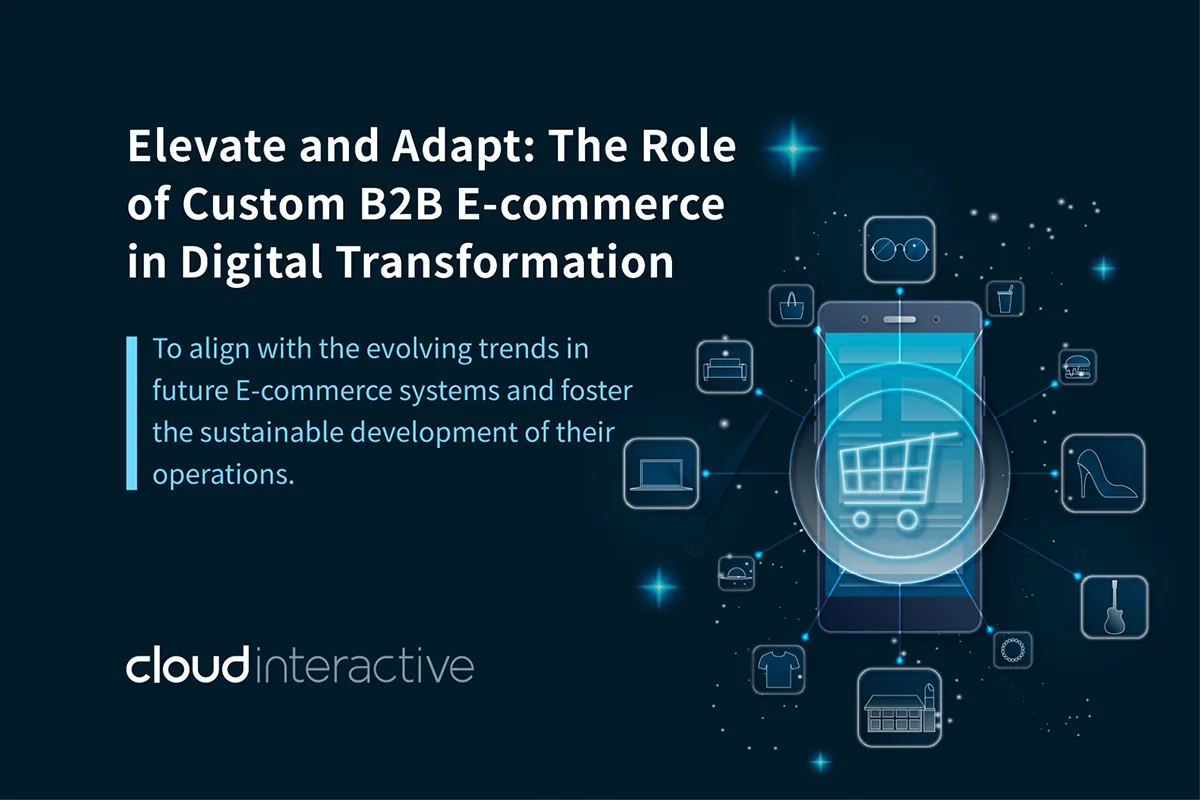
Elevate and Adapt: The Role of Custom B2B E-commerce in Digital Transformation
Discover what features your should look for in b2b e-commerce platforms.
With the increasing number of global internet users, e-commerce platforms have become a major component of modern commerce by 2023. However, as market competition intensifies, more and more businesses are concerned about whether their e-commerce systems have encountered a bottleneck in development.
Traditional one-stop e-commerce platforms are no longer able to meet consumers’ constantly changing needs, not only carrying extra commission fees but also offering limited goods and services, and lower flexibility in function adjustment. Therefore, customized e-commerce systems have become an essential choice for businesses. It can not only meet the specific needs of the business but also provide more personalized and optimized platform services, further enhancing the competitiveness and user experience of the website.
What are the basic features that an e-commerce system should have?
To effectively manage various channel operations and improve marketing effectiveness, companies usually hope that e-commerce systems can be customized according to their customer needs and preferences, thereby increasing customer satisfaction and loyalty. Therefore, a good e-commerce system should cover the following aspects:
Systematic product management
Product management includes operations such as uploading, editing, and deleting products, as well as product classification, tags, reviews, and other functions. To achieve efficient product management, the e-commerce system needs to provide a simple and easy-to-use interface, automatic product information capture and aggregation, etc., which not only saves manpower but also significantly increases enterprise efficiency.
Diversified marketing and discount settings
Due to the fierce competition in the e-commerce market, many companies are striving to find innovative sales strategies to attract consumers. How to set up marketing activities through a single platform has become an indispensable part. Such as product combination, pre-purchase, group purchase discounts, limited-time promotions, countdown activities, etc., and through built-in profit setting and checking mechanisms to facilitate enterprises to operate more efficiently, and ultimately achieve the marketing goal.
Cross-Platform Integration
Consumers today are accustomed to using a variety of different devices and platforms for shopping, including computers, mobile phones, and tablets. The e-commerce system needs to be able to run seamlessly on different platforms, thereby providing a unified and comprehensive shopping experience.
User Behavior Analysis
By providing data support to help companies better understand their target users, such as improving website design, adjusting product positioning, optimizing price strategies, etc., to design more accurate marketing strategies, and improve marketing effectiveness and return on investment.
Providing comprehensive assistance to enhance the commercial value of various industry brands
In response to the global e-commerce market layout after the pandemic, e-commerce platforms have become a basic requirement for digital transformation in various industries, not just exclusive to the retail industry. Industries such as food, medical, tourism, and education are actively hoping to jump on this transformation train. Therefore, how to systematically record business discussions and customized needs, so that companies can grasp market opportunities and allocate existing resources in the most cost-effective way to maximize business benefits, customized e-commerce systems have become the secret weapon for success in various industries.
For example, for the food industry, the system can provide personalized ordering and delivery services to the enterprise, and provide customized menus and ingredients based on customer tastes and preferences, optimizing products and processes to increase customer satisfaction. In addition, for the tourism industry, customized systems can provide personalized travel routes and services based on brand style, and provide customized travel plans and discounts based on customer preferences and budget, not only showcasing brand characteristics and increasing customer loyalty but also directly bringing the most realistic business benefits to the enterprise.
Tailored All-In-One E-commerce Solution
Although there are currently many software vendors on the market that focus on helping brands quickly set up their own e-commerce platforms by providing basic functions and design templates, which is convenient for start-ups and small businesses to enter the e-commerce market, there are still some hidden drawbacks for larger enterprises. For example, the risk and dependence are too high. Once the software development company stops serving or problems occur, the enterprise’s e-commerce platform will face losses. Additionally, there are also concerns about low flexibility and low security. Because off-the-shelf software cannot be designed and tested according to enterprise needs at any time, security and stability issues such as website hacking and system crashes can easily occur, affecting enterprise operations and user experience.
Therefore, customized e-commerce systems have become the first choice for many businesses. By designing platforms that meet user needs through customized functions and dedicated maintenance teams, businesses can effectively reduce risks and labor costs while increasing the competitiveness of their websites. In short, a customized e-commerce system is a long-term process that requires developers to continuously optimize and improve the system to enhance user experience and business value. Therefore, when choosing an e-commerce solution, businesses need to consider their own needs and development plans, and balance the scalability and maintainability of the system before selecting the best solution that suits them. Improving the immediate operational effectiveness of e-commerce systems is one of the important strategies for business development. Businesses need to pay attention to product quality, data security, and user experience, among other aspects, to capture the development trends of future e-commerce systems and promote the sustainable development of their operations
By Cloud Interactive
Meet the masterminds behind the curtain at Cloud Interactive. We're not just software developers - we're also a content crew fuelled by caffeine and a thirst for knowledge. We translate tech jargon into plain English, dissect industry trends, and craft helpful tips that are informative and engaging. So, buckle up and join us on a journey through the ever-evolving and exciting world of technology!


